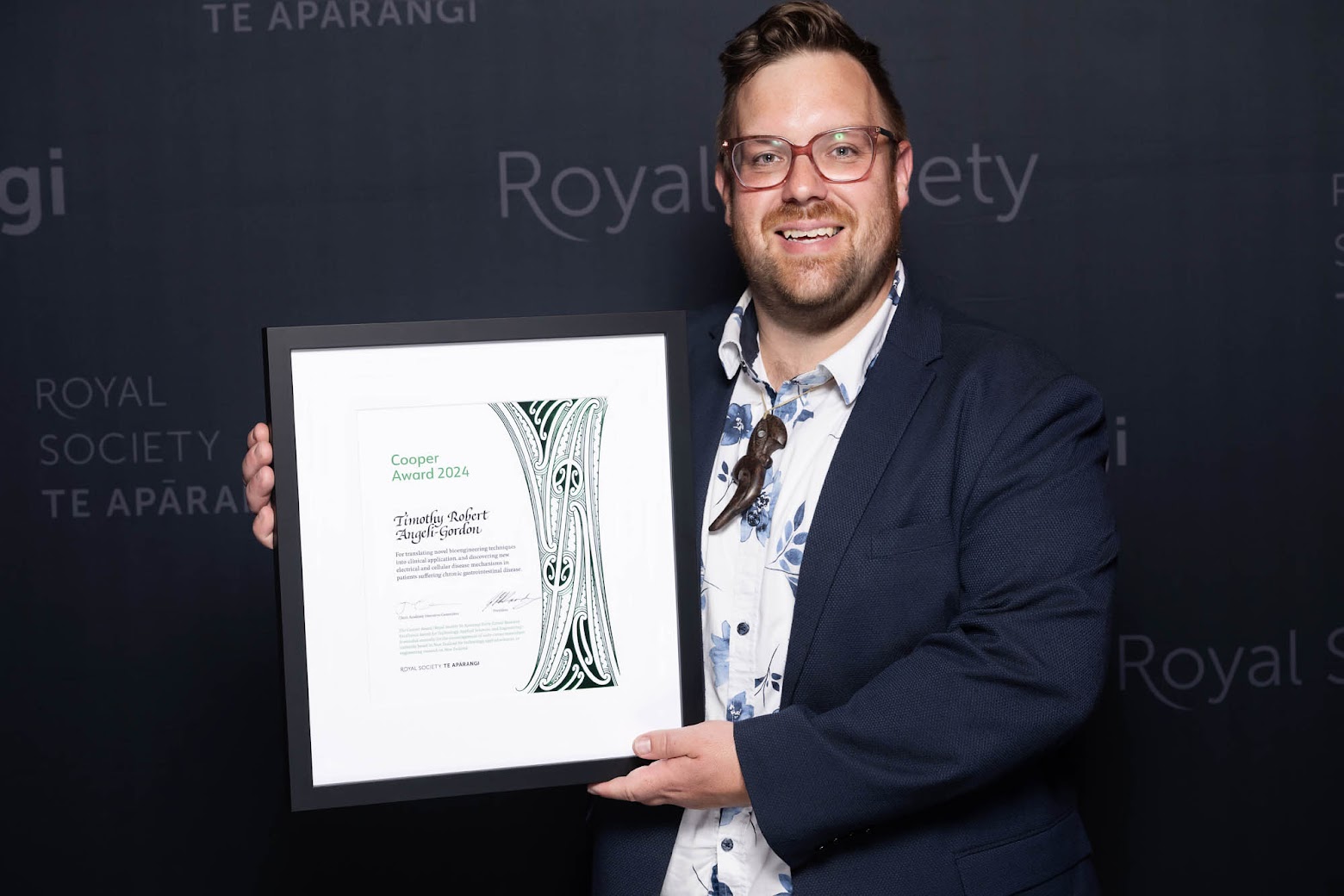2024 Cooper Award: Diagnosing elusive gut problems with med-tech

Dr Timothy Angeli-Gordon, of Te Wānanga o Aotearoa, has been awarded the Cooper Award for investigating the electrical and cellular mechanisms causing chronic gastrointestinal disease and using bioengineering techniques to diagnose and treat patients with gut problems.

Research by Tim and his team has led to the development of a new medical device that could allow clinicians to diagnose hard-to-identify stomach complaints, like gastroparesis, without invasive surgery. The endoscopic mapping device consists of an inflatable sphere covered in sensors which is inserted via the oesophagus – it's able to measure electrical activity in the gut.
Gastrointestinal disorders can cause major clinical, economic, and societal burdens. Patients who have debilitating symptoms often have limited options for diagnosis and treatment.
When Tim was based at the Auckland Bioengineering Institute, at the University of Auckland Waipapa Taumata Rau, he led an international team of engineers, clinicians, and physiologists in a study that applied high-resolution electrical measurement techniques, combined with cutting-edge tissue imaging, to investigate electrical and cellular abnormalities in patients with chronic nausea and vomiting.
Tim was the lead author of the paper ‘Loss of Interstitial Cells of Cajal and Patterns of Gastric Dysrhythmia in Patients With Chronic Unexplained Nausea and Vomiting’ published in 2015 –ad year after completing his PhD. These results laid the foundation for the new device.
He is now the Senior Rangahau & Innovation Manager at Te Manawahoukura, the Rangahau Centre at Te Wānanga o Aotearoa, and continues to collaborate with his former colleagues through a partial appointment as a Senior Research Fellow at the Auckland Bioengineering Institute and the Department of Surgery at the University.
Members of the selection committee were impressed by Tim’s ability to bridge the gap between engineering innovation and clinical applications. His leadership in transferring high-resolution electrical mapping techniques from the research laboratory to the operating room is a testament to his vision and commitment to translational medicine.
Tim has received prestigious grants, including a Fast Start Grant from the Marsden Fund worth $300,000, a Rutherford Discovery Fellowship worth $800,000, and most recently a Project Grant from the Health Research Council worth $1.2 million. He is a current member of The Auckland Medical Research Foundation’s Medical Advisory Committee and volunteers as the Treasurer of Te Kōhanga Reo o Kākāriki, where his youngest daughter attends.
Tim says he is extremely honoured and humbled to receive the Cooper Award from the Society.
“My motivation and passion for biomedical engineering can best be summarised by the well-known whakataukī, ‘He aha te mea nui o te ao? He tangata, he tangata, he tangata.’ (What is the most important thing in the world? It is the people, the people, the people.)”
He says he chose to work in this field because he wanted to positively impact people, particularly those suffering from health challenges with limited options for diagnosis or treatment.
“I am incredibly proud to have been part of a team that has made some progress toward that goal in my career thus far, and I look forward to continuing this exciting research from my new position in Te Manawahoukura Rangahau Centre, Te Wānanga o Aotearoa.”
Tim says the award is ultimately a reflection of the excellent colleagues and teams that he has worked with.
“I have been fortunate to have some visionary, generous, and supportive mentors in my career, including some that provided references for my nomination for this award. I will forever be grateful to those individuals for investing and believing in me.
“I have also been fortunate to get to work alongside many brilliant technicians, students, and post-doctoral research fellows. Seeing those individuals succeed, for example in leading their own award-winning research, is what brings me the most joy in my career.”
The Cooper Award:
The Cooper Award is for early career research in technology, applied sciences, or engineering.
Citation:
To Timothy Angeli-Gordon for translating novel bioengineering techniques into clinical application, discovering new electrical and cellular disease mechanisms in patients suffering chronic gastrointestinal disease, to international acclaim.
